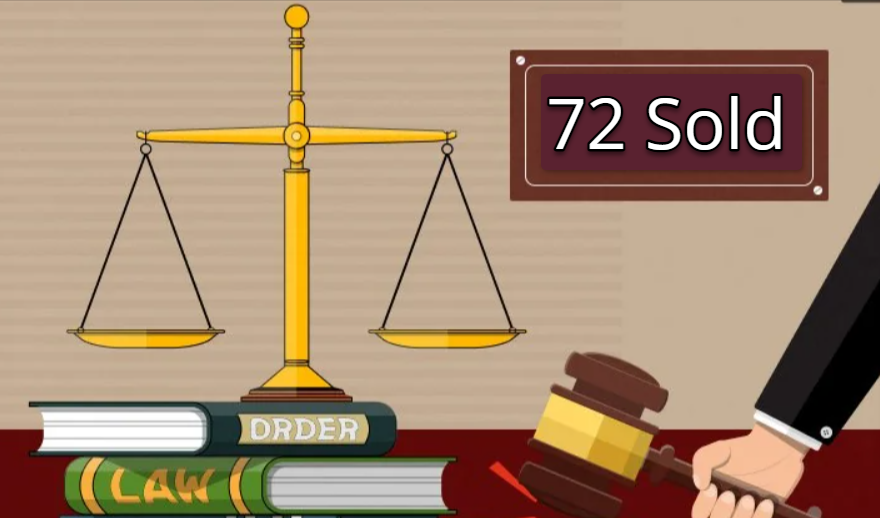Recently, a rise in frauds and scams targeting real estate has made a lot of consumers uncertain and unsure as “72 Sold Reviews Consumer Reports” being a frequent search phrase on the internet.
Real estate companies like 72 Sold promise fast home sales that require no effort But are they too appealing to be true?
Property scams have increased by 30% over the past five years according to the most recent information on consumer fraud it is crucial to be aware of this program’s promises, as well as the steps that you could use to safeguard yourself.
72 Sold’s claim of selling homes in only 72 hours has attracted a large number of people. However, the mixed reviews of consumer surveys provide both satisfied buyers and people who believe they were misled.
In the wake of the 72 Sold Lawsuit, issues like the unfulfilled promises, hidden fees as well as insufficient disclosures are a common complaint. This is why it is necessary to take an investigation into the way such programs operate.
If you’re considering ways to sell your house or are concerned about misleading marketing This article will offer some clarity.
On this site, I’ll look at reviews, real-life stories and legal recourses available in the event that you feel you have been wronged. Keep yourself informed so that you don’t make costly mistakes. Your peace of head and your property’s worth are well-deserved.
So, continue through this blog until the end of this blog to know further…
72 Sold Overview
72 Sold, a estate firm that guarantees homeowners to let their properties sell within 72 hours, thanks to a speedy process.
The company is primarily run through local agents and has gained a lot of attention because of its bold claims of speedy sales with minimal effort from homeowners.
The idea for 72 Sold lies in its ability to make home sales more efficient and easier, but it is important to know how the program operates and what you can anticipate.
At its heart 72 Sold provides an innovative approach to linking home sellers to certified agents who adhere to a particular selling procedure that is designed to speed up the listing marketing, sale, and listing.
But, like many real property services, the outcome will vary greatly. While some homeowners have reported successes while others have expressed concerns about hidden charges and unfulfilled expectations.
Understanding the details of the 72 Sold process and the reviews is essential to anyone who is considering the service.
While it could appear to be an easy fix, taking into consideration all the advantages and drawbacks, and conducting thorough research prior to getting involved is essential. When you do this, it will be able to determine if this option is suitable for you.
Is 72 Sold Legit?
Before you make an assessment of the authenticity of the platform Let me assure you that 72 Sold is a 100 100% legitimate company.
In 38 US areas, the 72SOLD network of real estate agents sells homes. Greg Hague, a realtor from Arizona who founded Hague Partners in 1998, founded the company in 2018.
The company has gained a reputation for its unique home-selling approach. For example, in 2022-2023, Inc. listed 72SOLD as one of the fastest growing companies.
Additionally, 72SOLD and Keller Williams have formed a strategic alliance June 2022. It allows KW agents to utilize 72SOLD. 72SOLD program. Furthermore it is a partner in Arizona Diamondbacks, the Major League Baseball franchise, the Arizona Diamondbacks.
Additionally, 72SOLD has the A+ rating, which is accompanied by an Better Business Bureau accreditation. A Better Business Bureau evaluation of a company’s likelihood to provide customer service is revealed into it’s BBB ratings.
However, 72SOLD may not be the best option If you’re looking to get the most value for your sale. The highest price is usually not the result of a fast sale.
The Recent 72-Sold Lawsuit
Recently 72 Sold found itself in the middle of a legal dispute since a number of homeowners have filed lawsuits alleging they were misinformed about the company’s process for selling homes.
Like the Verizon suit, the one is based on allegations of deceitful advertising, hidden costs and the inability to meet the 72-hour sales deadline.
Many users say that the platform imposed additional fees, which they had not disclosed at first. The result was that they were unhappy and financially hurt.
While 72 Sold promotes itself as a stress-free method to help you sell your home fast However, some have discovered that the process was not as easy or clear as they expected.
The lawsuits seek damages compensation as well as to hold the business accountable for any fraudulent claims.
If you’re thinking of applying for 72 Sold, or are using it, you must be aware of the legal changes. Knowing your rights and the actions you could take in order to safeguard yourself is crucial.
In a similar scenario or simply being cautious, being up-to-date on lawsuits will help you avoid problems.
72 Sold Reviews Consumer Reports: What Do They Say?
If you’re doing research on “72 Sold Reviews Consumer Reports,” you’ll see that opinions regarding the website have gotten more and more mixed, particularly after this lawsuit.
While some users are elated by the ease of selling homes through the company Some have raised questions about the transparency of the process, the hidden costs and unfulfilled expectations. Let’s try to figure out what this means for you.
Before the lawsuit, Sold had a booming consumer base thanks to its distinctive claim of selling homes in 72 hours. A number of positive reviews pointed out how the program streamlined selling procedures, making it easier for homeowners to save time and effort.
However, user reviews have changed dramatically since the lawsuit that claims deceitful practices and deceptive advertisements. Trust among consumers has clearly decreased, with the site being reported to have experienced 20% decline in users over the last year.
Reviewers who have negative experiences on platforms such as those of the Better Business Bureau and consumer forums frequently mention hidden charges that aren’t disclosed at the start.
Customers have also complained of delays in closing timeframes in direct contradiction to the 72-hour guarantee offered by the company. The resulting confusion has caused numerous potential customers to look for alternatives or seek more information prior to engaging with the service.
But that, not all reviews are positive. Certain homeowners find an advantage in 72 Sold particularly those who were able to close deals without issues. However, the inconsistent nature of the results demonstrates the importance of due diligence. crucial.
If you’re thinking of using 72 Sold, take a look at recent reviews and look for patterns in the reviews. Learning about negative and positive experiences can help you determine whether the product is right for you.
Legal Implications of False Advertising in Real Estate
False advertising in the real estate industry could result in serious financial and legal implications for both consumers and businesses. It’s not just illegal, it’s illegal.
Companies such as 72 Sold, which is currently under investigation, demonstrate the importance of ensuring that service providers are held accountable.
The real estate industry includes large sums of money and emotional investment. Thus, false statements can cause serious harm.
Let’s take a close examine the legal consequences of advertising that is false:
What Constitutes False Advertising in Real Estate?
False advertising in the real estate industry can occur when a firm is able to make false or misleading assertions about its services or properties.
Examples include understating the property’s worth, hiding crucial flaws or making untrue promises for example, such as guaranteeing a fast sale.
You can categorize false marketing claims for example “no hidden fees” or “sale guaranteed in 72 hours,” as misleading advertising in the event that the business fails to reliably deliver these.
According to federal and state laws, any form of misrepresentation–intentional or not–can lead to lawsuits and penalties.
Consumer Rights in False Advertising Cases
As consumers as a consumer, you are entitled to honest and reliable information when purchasing and selling properties. It is the Federal Trade Commission (FTC) enforces laws against deceptive advertisements and several states have consumer protection laws.
You can file a claim to the FTC or the real estate board in your state If you are concerned that you’ve been you’ve been misled. These agencies investigate claims and initiate action against businesses that engage in fraudulent advertising.
Legal Remedies for Victims of False Advertising
Legal recourse is available in the event that you’ve been harmed by fraudulent advertising. You can seek compensation through civil lawsuits, seeking compensation for financial losses or charges that the platform failed to provide you with prior notice of.
The courts can also award punitive damages in the most severe of instances, sending a clear signal to businesses about the negative consequences of unethical behavior. In addition, a class-action suit could be a viable option in the event that the problem affects many customers.
What Legal Steps Can You Take?
If the deceitful practices of marketing in the field of real estate have deceived you, you are entitled to legal options to safeguard your rights and get back any loss. These steps can assist you to find justice and ensure that other people do not have to face similar situations.
Let’s break it into three practical steps including gathering evidence, submitting complaints, and seeking legal actions.
Following these steps will make deceptive businesses accountable while safeguarding your rights as well as your financial wellbeing.
1. Gather Evidence to Support Your Claim
The first step in stopping fraud is gathering reliable evidence. Record everything connected to the transaction. This includes contracts, emails marketing materials, any communications with the company or agent.
If a business made specific promises (such such as “no hidden fees” or “quick sale within 72 hours”) which they didn’t adhere to, record the promises made.
Also, collect evidence of financial losses such as delay, fees or other costs that result from a false advertisement.
Making photos, storing receipts as well as keeping notes about your experience will help strengthen your argument. Evidence that is organized and clear is vital if you choose to take legal action.
2. Submit a Complaint to Relevant Authorities
After you’ve collected evidence then the second step will be to submit your concerns to appropriate authorities. Begin by filing complaints to the Federal Trade Commission (FTC) that investigates fraudulent business practices. It is also possible to contact any state’s realtor regulator as well as the consumer protection department.
They could open an investigation, issue sanctions on the business or give advice regarding the next steps you could decide to take.
The filing of a complaint can help keep a record of the incident, which could be helpful if other people are experiencing similar issues and a more thorough investigation is started.
3. Pursue Legal Action for Compensation
A consultation with a real estate attorney is essential in the event of serious emotional or financial harm.
They’ll evaluate your case and suggest the most appropriate course of option, which could be the filing of a civil lawsuit is the best option or taking part in a class action lawsuit if others are similarly affected.
It is common to seek compensation for the financial loss as punitive damages or even attorney’s costs. Legal professionals can assist in negotiations for settlements outside of court, which can save time and energy.
Bonus: Best Real Estate Lawyers in the USA Right Now!
In the event of a complex real estate matters, such as deceitful marketing, dispute over contracts, or fraud in property–having a knowledgeable real estate lawyer on your on your side can make the difference.
The top real estate attorneys throughout the USA are well-known for their professionalism, expertise, client-centric approach, and a proven results.
Here’s a look at a few of the best names in the business today.
| Lawyer | Location | Other Practice Area |
| Robert P. Abdo | Minneapolis | Entertainment Law |
| Jeffrey A. Abrams | Indianapolis | Corporate Law |
| William B. Acker | Troy | Litigation and Controversy, Tax Law, Eztate Planning |
| Jeffrey C. Adams | Atlanta | NA |
| Eben Adams | Portland | Land Use and Zoning Law, Commercial Transaction Law |
News source: lawyersinventory.com/72-sold-reviews-consumer-reports




